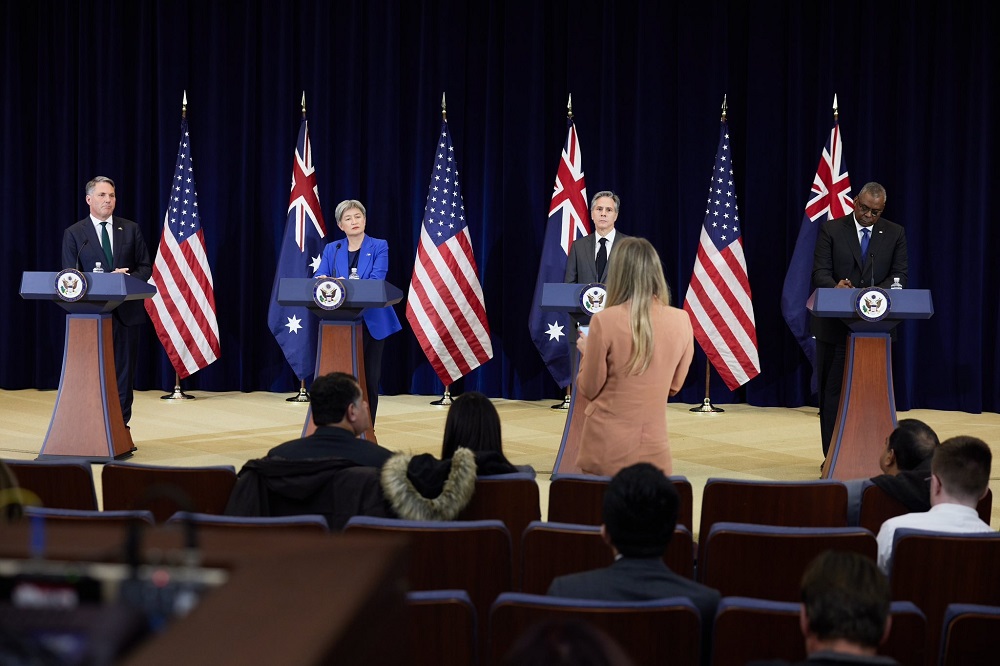
On 6 December, Foreign Minister Penny Wong and Defence Minister Richard Marles met with their US counterparts, Secretary of State Antony Blinken and Secretary of Defense Lloyd Austin, for the annual Australia – United States Ministerial Consultations, or AUSMIN, held this year in Washington DC.
In addition to the four principals, the Australian and US delegations
included senior defence, intelligence and foreign policy officials. This tendency towards a security focus is born out of AUSMIN’s origins in the
ANZUS Treaty, which established ‘a Council, consisting of [the parties’] Foreign Ministers or their Deputies, to consider matters concerning the implementation of this Treaty’. The first bilateral meeting held under the auspices of AUSMIN was in 1985, following the United States’ 1985 suspension of its security commitment to New Zealand for refusing port access to US nuclear submarines.
It was therefore interesting to see the most recent AUSMIN
joint communiqué commit to ‘establishing a regular meeting between the Australian Minister for International Development and the Pacific and US Agency for International Development Administrator to support closer development cooperation throughout the Indo-Pacific region and globally’. Given the
alignment in the two countries’ ‘political will and strategic visions’ for foreign aid, it makes sense to hold regular high-level dialogue between development leaders. But, recognising that development is central to the international relations and security aspirations of AUSMIN, such discussions shouldn’t remain discrete. There’s a clear case for the consultations to become 3D—that is, to elevate development alongside diplomacy and defence by including both countries’ most senior development representatives.
The joint statement identifies a litany of global and regional issues and challenges for Australia and the US to cooperate on. In the first paragraph alone, both countries commit ‘to advanc[e] a stable, rules-based international order’, ‘strengthen and reform the multilateral system … to address the climate crisis’, and ‘protect and promote human rights … and advance the rules of the road for technology, cyberspace, trade, and commerce’. Development already plays a key role in delivering on a number of these goals; aside from the obvious human security benefits of development assistance, Australia’s aid program also supports regional
cyber and
climate resilience, for example. But few if any of these goals fit a purely development, diplomacy or defence categorisation, and achieving them will require coordination across the policy communities—each of which brings unique capabilities, perspectives and experiences that are essential but alone inadequate.
It’s evident that each country recognises this and is working to reconfigure its foreign policy toolkit in response. In Australia there’s been a
growing appreciation among senior politicians, policymakers and officials of the need to respect, resource and coordinate all the arms of statecraft in the context of a more challenging environment. Wong has
stressed that ‘[f]oreign policy must work with other elements of state power to succeed’, while Marles
wants to ‘marshal and integrate all arms of national power to achieve Australia’s strategic objectives’.
This rhetoric is slowly being translated into reality: the Department of Foreign Affairs and Trade’s Office of the Pacific was established in 2019 with a
mandate ‘to enhance whole-of-government coordination and to drive implementation of [Australia’s] regional activities’, and the
terms of reference for Australia’s new international development policy declare that it ‘will be whole-of-government and outline the use of Official Development Assistance (ODA) and non-ODA to advance a peaceful, stable, and prosperous Indo-Pacific, alongside Australia’s diplomatic, economic, defence, and security engagement’.
The US has similarly honed in on diplomacy and development as key assets that complement and work in concert with defence; the
US Global Fragility Act , for example, emphasises the shaping role each can play to help prevent conflict and instability and reduce the need for a defence response. This dynamic was
pithily captured in 2013 by then–defence secretary Jim Mattis: ‘If you don't fund the State Department fully, then I need to buy more ammunition ultimately.’
The Biden administration’s
2022 national security strategy is explicit in saying it ‘encompasses all elements of national power—diplomacy, development cooperation, industrial strategy, economic statecraft, intelligence, and defense’ in pursuit of goals almost verbatim to those in the AUSMIN Joint Statement. The
2022 national defence strategy likewise outlines the concept of ‘[i]ntegrated deterrence [which] means using every tool at the Department’s disposal, in close collaboration with our counterparts across the US Government and with Allies and partners’.
There’s clearly an appetite among US and Australian policymakers for more joined-up thinking when it comes to formulating and prosecuting foreign policy, and bringing the development portfolio into AUSMIN would align with the integration agendas of both countries. Having the Australian development minister and USAID administrator in the room would be a powerful signal to their respective bureaucracies that such an approach is here to stay and to maintain momentum. As well as enhancing cooperation and coordination on shared interests and specific challenges, a 3D AUSMIN would open up opportunities to have conversations and share lessons on how to implement, operationalise and align whole-of-government statecraft more broadly.
Australia didn’t have a minister for international development when AUSMIN was established almost 40 years ago, and development has traditionally been an underdone aspect of the US–Australia alliance (as Marles
recognised in July). But with aid
emerging as a focus for both governments amid a more challenging strategic environment that demands smarter statecraft, now is the time to bring development into the AUSMIN fold.
 Print This Post
Print This Post